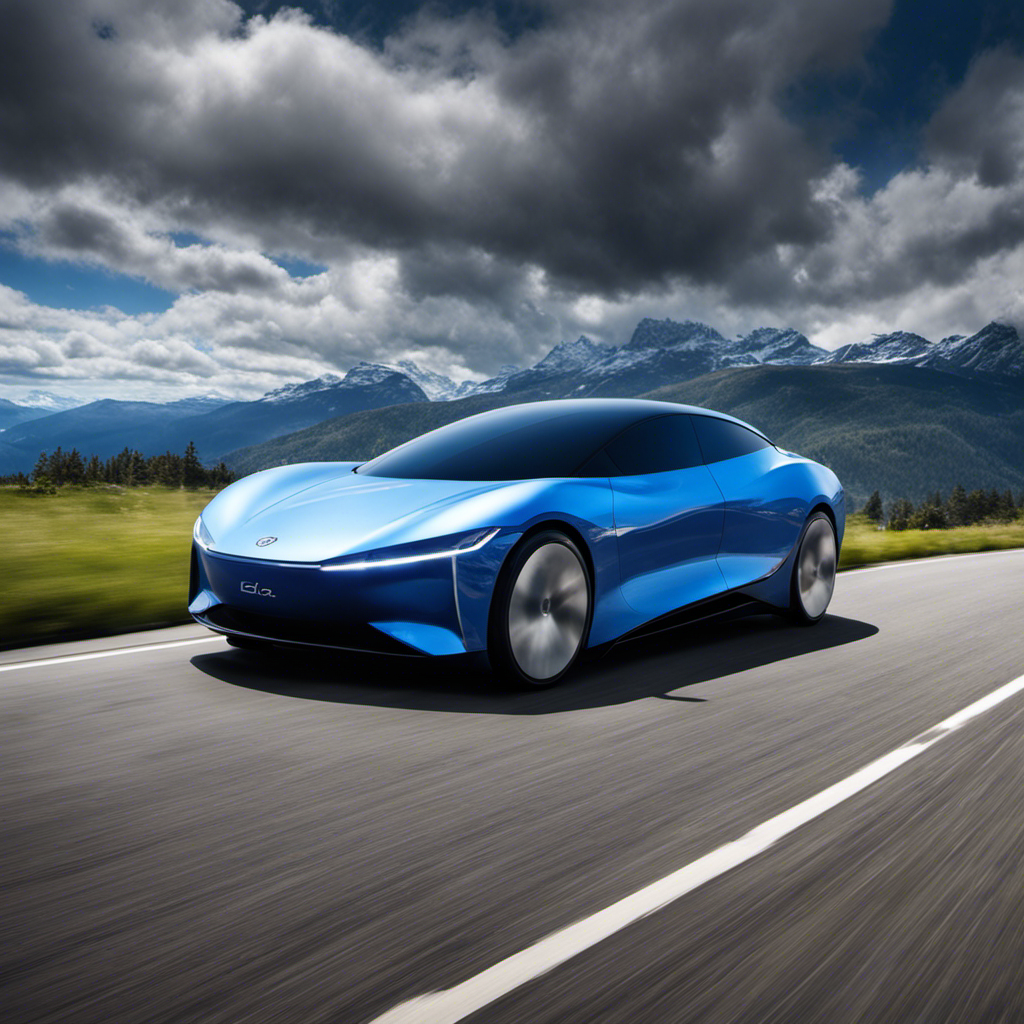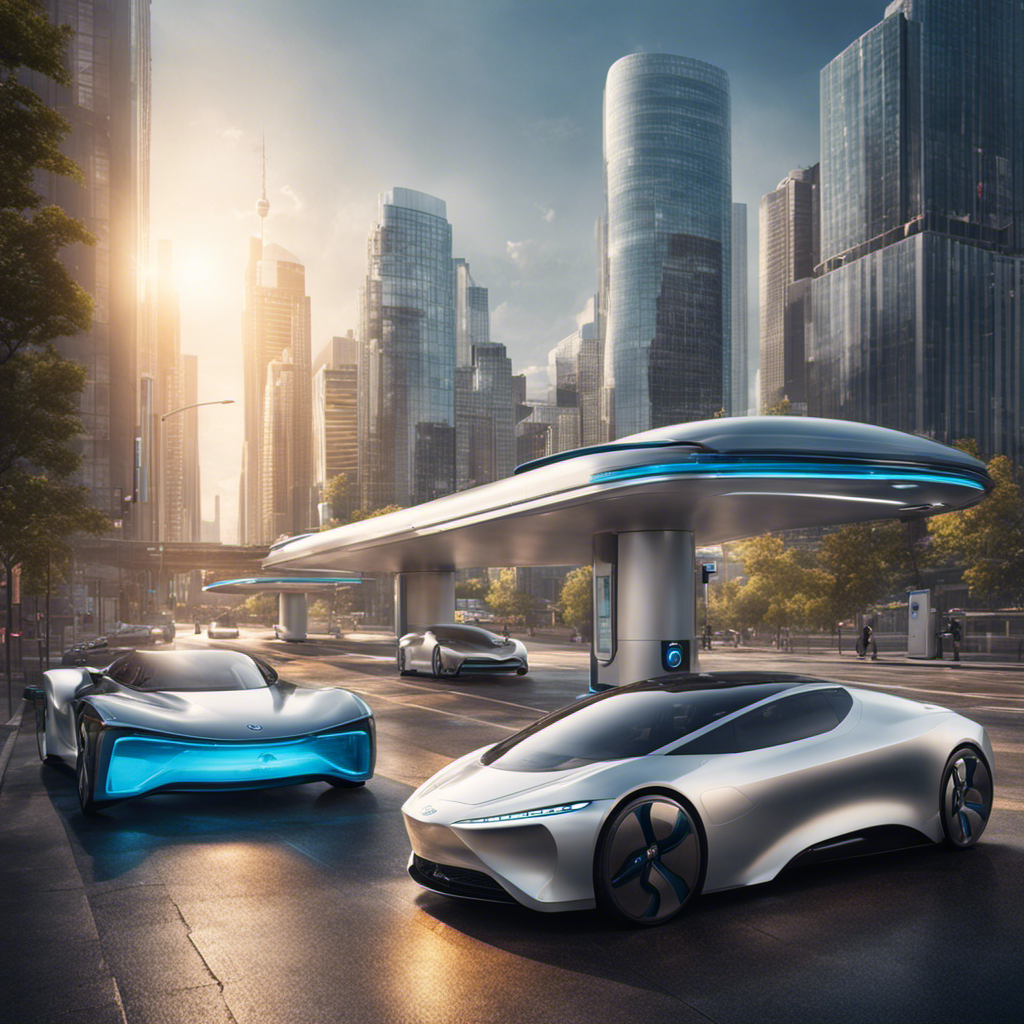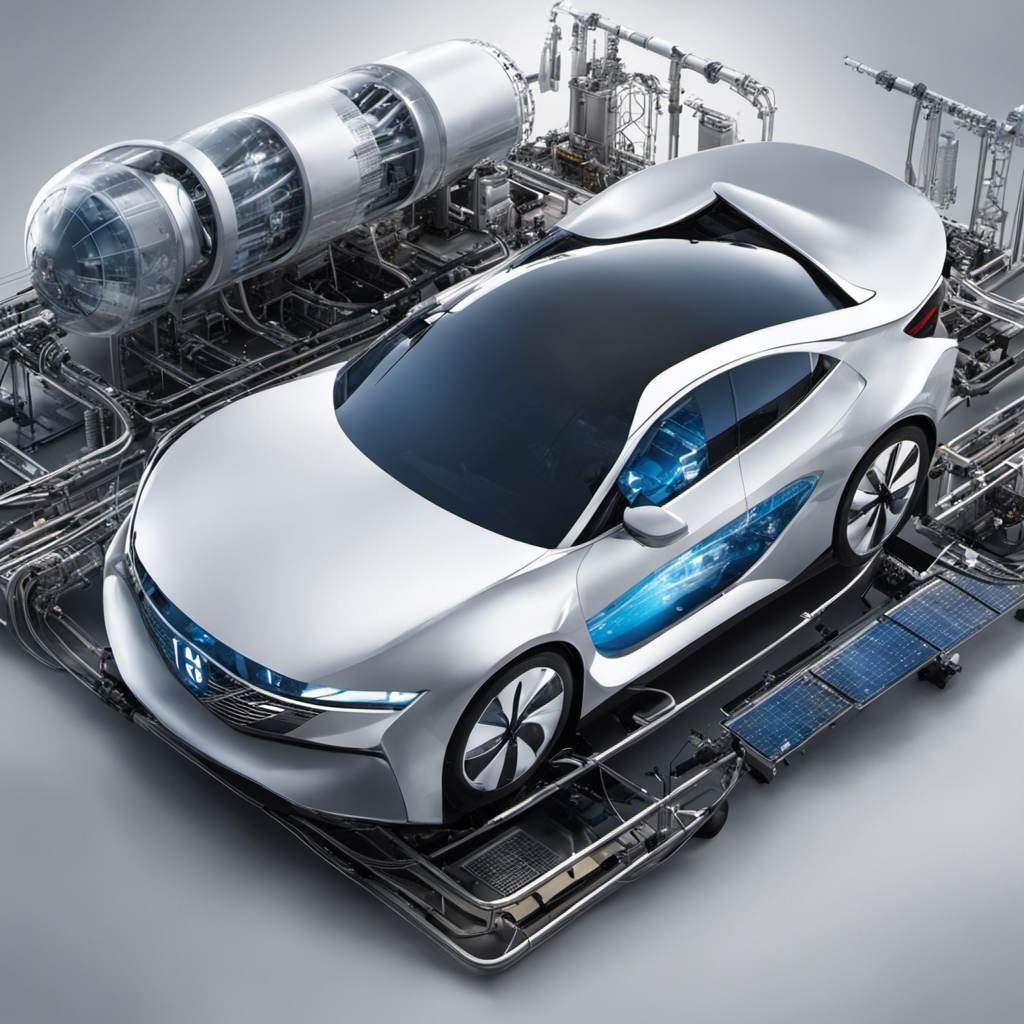Electricity Vehicle
The Growing Popularity and Value of Electric Cars

Electric vehicles are increasingly gaining popularity, attracting many cost-aware consumers looking at them as potential options for their upcoming purchase. Offering a multitude of advantages like saving on costs, enhanced fuel efficiency, reduced emissions, and conservation of the environment, electric cars present an unmatched value deal that is difficult to surpass.
When it comes to cost savings, the money you save on gas alone can make the upfront costs of an electric vehicle well worth the investment. For instance, according to Consumer Reports data from 2019, drivers in California saved $1,000 annually on average by switching from a gasoline powered car to an electric one. That number jumps up even higher if you live in states like Texas or Illinois where electricity prices are lower than those in California.
Another great benefit is being kinder to the environment. Electric cars have zero tailpipe emissions and are therefore much better for air quality compared to traditional petrol driven vehicles. In addition, they use no oil or other fluids so there’s less waste produced during maintenance when compared to petrol powered cars.
The fact that electric cars require significantly fewer moving parts also makes them incredibly efficient; some models get over 200 miles per charge! This eliminates trips to the pump altogether while reducing overall operating costs which helps offset any differences between fuel and energy expenses throughout ownership of your vehicle. Now let’s take a look at understanding how much it will actually cost to own an electric car…
Understanding Electric Car Costs
When it comes to electric car costs, budget-conscious buyers have a lot to consider. Understanding the total cost of an electric car is not always straightforward and requires some research in order to make smart decisions when buying one. So what should you look out for?

To start with, price comparisons are essential. Compare prices between different models and even brands as there will be variations. It’s also worth looking into any special offers or discounts that might apply to certain vehicles. Additionally, take factors such as running costs into account; although electric cars may require less maintenance than their gasoline counterparts, they still require energy (electricity) which needs to be taken into consideration too.
For those who want to save further on their purchase, there are various tips and tricks available online for budgeting for an electric car. For instance, researching local grants or tax incentives can help reduce the overall cost of ownership significantly – something well worth considering before committing to a purchase.
Electric cars offer great value for money when factoring in their lifespan and fuel savings over time – so getting your head around up-front costs is certainly worth it! With this knowledge under your belt, you’ll be better equipped when making decisions about affordability of electric cars down the line.
Factors Impacting The Affordability Of Electric Cars
Now that we understand the basic costs associated with electric cars, let’s look at some of the factors influencing their affordability. For those on a budget, range and battery life are likely to be two major considerations when choosing an electric car. Many economy models have shorter ranges than their pricier counterparts and may need more frequent charging – something which could add up if you’re not near a charging station or don’t own one yourself.
It is worth looking into maintenance costs too; while these tend to be relatively low for electric vehicles compared to traditional petrol-powered cars, they can still vary depending on the model you choose. As well as factoring in any additional charges like registration fees or insurance premiums, it pays to keep an eye out for any available tax incentives or other discounts. These can make a significant difference in reducing the overall cost of buying an EV and should definitely be taken advantage of where possible.
Comparing available models and prices is arguably one of the most important steps when searching for your ideal affordable electric vehicle. By researching different makes and models thoroughly before making a decision, you’ll be able to ensure that you get exactly what you need without breaking the bank!
Comparing Available Models And Prices
When it comes to electric car models, there are a lot of options out there for budget-conscious buyers. It’s important to compare prices and features when considering which one is the right fit. Here we’ll look at five of the most affordable cars on the market today.
The Hyundai Kona Electric stands out as an especially good value. It has a range of up to 258 miles per charge and can be had for around $37,000 with federal tax credits applied. Its interior also offers plenty of space for passengers and cargo alike, making it a great choice for those who need something practical but don’t want to break the bank.
Another option that won’t blow your budget is the Nissan Leaf Plus S. This model has a range of up to 226 miles per charge and starts around $32,500 after incentives have been applied. With its sleek design and modern tech features, it’s sure to turn heads while being easy on your wallet.
For those looking for an even more cost-effective solution, the Chevrolet Bolt EV may be just what you’re looking for. Starting at around $31,000 after incentives, this car still packs quite a punch with 259 miles of range per charge. Plus with its roomy interior and impressive array of safety features, you can feel confident in knowing you made a smart purchase without sacrificing quality or performance.
So if you’re shopping around for an electric car on a budget, these five models offer some great deals without compromising on quality or performance. Now let’s take a look at how far each vehicle can go on a single charge – an important factor when choosing between available models – as well as their battery life considerations before making your final decision.
Range And Battery Life Considerations
Range and battery life are two of the most important considerations when shopping for an electric car. Without adequate range, a vehicle can be rendered essentially useless for long distance driving. Fortunately, with advances in battery technology, many budget-friendly vehicles now offer ranges on par with some of their more expensive counterparts.
When assessing a vehicle’s range capabilities, it is important to consider its battery capacity as well as how much power is needed to propel the car along different types of terrain and at varying speeds. Many cars advertise impressive range numbers based off of ideal conditions such as flat roads or low speed travel. It’s important to take into account that these figures may vary significantly in real world scenarios.
Ultimately, if you plan on using your electric car for longer trips or highway commutes, make sure you do your homework before making a purchase decision. Make sure a model has enough range to cover all your needs without running out of juice prematurely.
Charging Stations And Availability In Your Area
Powerful possibilities for purchasers of electric cars are popping up all over. For budget-conscious buyers, it’s important to consider the charging availability in their area before making a purchase decision. With electric car charging stations becoming more commonplace and accessible, local availability is now easier than ever to check on.
For starters, many cities are offering incentives such as free parking spots or discounted rates at public chargers that can make owning an electric vehicle cost effective. On top of that, there are also numerous private companies setting up powerful charging networks across the country with flexible payment plans. This means you could potentially charge your car right outside your home without having to pay anything extra beyond the initial cost of installation.
No matter where you live, researching options for electric car charging availability should be part of any serious buyer’s process when considering an EV purchase. And with so many advantages available to those who go green, why not take advantage? Transitioning into the subsequent section about maintenance costs for electric vehicles may seem like a daunting task but its one worth taking on if you want to get behind the wheel of an economical and eco-friendly ride.
Maintenance Costs For Electric Vehicles
Maintenance costs for electric vehicles are significantly lower than those of traditional gasoline-powered cars. This is because electric cars don’t require oil changes or regular tune ups, which can be costly and time consuming. Plus, the brakes on an electric car last much longer due to regenerative braking, where energy is stored in the battery when you slow down or stop. Electric cars also have fewer moving parts overall compared to their gas powered counterparts, so they’re less likely to need expensive repairs over time.
It’s important to note that although electric vehicles may not need as many repairs as a traditional vehicle, they still require some basic maintenance such as replacing wiper blades and tires, checking fluid levels and keeping the batteries charged. However, since most EV owners charge their vehicles at home overnight this isn’t usually an issue. And if something does go wrong with your EV, specialized mechanics who specialize in electric cars are becoming more common these days so repair costs shouldn’t be too high either.
Overall, it’s clear that owning an electric car is cheaper than running a conventional one in terms of maintenance costs alone – making them a great investment for budget-conscious buyers looking for long term savings. Now let’s look at how tax incentives might help reduce the cost of purchasing an electric car even further…
Tax Incentives For Purchasing An Electric Car
Did you know that electric car tax incentives can save drivers up to $7,500? This alone is a compelling reason for budget-conscious buyers to consider making the switch from traditional gasoline cars to an electric vehicle. As governments across the globe strive to reduce their carbon footprint and promote renewable energy sources, generous tax breaks are being offered in many countries.
Electric car tax breaks include federal or state income tax credits which may be applied when buying a new EV. In some countries, electric vehicles also qualify for local property taxes reductions or exemptions as well as reduced registration fees. Furthermore, there could be other incentives such as free parking access or use of lanes restricted only for EVs on congested roads. For instance, in France all-electric cars enjoy unlimited free parking in Paris city center.
In addition to these electric vehicle tax credits, some employers offer subsidies and deductions for employees who purchase an EV – another way to help make it more affordable. These benefits vary widely by country so individuals should research what’s available before deciding whether to go electric or not. All these combined provide great relief when purchasing an electric car but don’t forget insurance considerations—the next step in owning your own eco-friendly ride!
Insurance Considerations
When it comes to electric car insurance, budget-conscious buyers should compare rates and research coverage options. Insurance companies are beginning to offer specialized policies for electric cars that cover the cost of repairs due to mechanical failure as well as provide liability protection in case of an accident. It’s important to shop around and ask questions when considering any type of auto insurance policy; this is especially true if you’re looking at a dedicated electric car coverage plan.
It’s also worth noting that some insurers may charge higher premiums for electric vehicles since they often have more expensive parts than their gas-powered counterparts. Depending on your driving habits and other factors, these costs could be offset by savings on fuel expenses over time so don’t let sticker shock deter you from taking a closer look at potential plans.
Ultimately, finding the right balance between protection and affordability can help ensure peace of mind while also helping keep your wallet happy. Now let’s take a look at financing options available to budget-conscious buyers interested in an electric vehicle purchase.
Financing Options
When it comes to budget-conscious buyers, electric cars can be a great option. Fortunately, there are plenty of financing options available for those looking to purchase an electric car. From electric car loans to electric car leasing and even electric car payment plans, buyer have plenty of choices when it comes to finding the right financial solution for their needs.
Electric car loans offer potential buyers the ability to pay off their vehicle in installments over time. This is usually done through a bank or other private lender who will approve the loan based on creditworthiness and other factors. Buyers should shop around carefully for the best interest rate before settling on one particular lender.
Leasing an electric car is also becoming increasingly popular among budget-conscious buyers due to its flexibility and affordability. Leases tend to have lower monthly payments than traditional auto loans because they require less upfront money down towards the cost of the vehicle. Additionally, some leases come with additional benefits such as free maintenance and roadside assistance packages that make them more attractive than buying outright.
Finally, many manufacturers offer special financing programs specifically tailored towards purchasing an electric car. These programs may provide incentives like zero percent APR rates or longer repayment terms which can reduce the overall cost of ownership significantly. It’s important to research these offers thoroughly prior to making any decisions however, as they typically contain restrictive clauses that could potentially end up costing you more in the long run if not properly understood beforehand.
Frequently Asked Questions
What Is The Average Price Of An Electric Car?
Electric cars are becoming increasingly popular, with their lower running costs and environmental benefits. But what is the average price of an electric car? Well, it really depends on your budget – electric car prices range from around $20k to upwards of $70k depending on make and model. They can also be more expensive than traditional gas-powered vehicles in terms of initial cost. To give you a better idea about the cost comparison for electric cars, here’s a breakdown of the pricing:
- An entry level electric vehicle could start at around $20k-$30k
- Mid-level models typically fall between $35k-$50k
- High-end options generally begin at over $50k
- Luxury models may exceed $75K
When shopping for an electric car it’s important to research all available models within your budget before making any decisions. While there are great deals to be found, some luxury brands like Tesla come with a premium price tag. It pays to shop around and compare different makes and models as well as look for discounts or special offers that might help bring down the overall cost of ownership. Many manufacturers offer incentives that can reduce the sticker price significantly when purchasing an electric car so keep this in mind during your search.
Overall, electric cars offer considerable savings once they are purchased but the higher upfront costs compared to petrol powered alternatives should still be taken into consideration when deciding which type of vehicle is right for you. With careful research and planning, you’ll be able to find a great deal on an affordable yet efficient electric vehicle that fits both your lifestyle and budget needs.
How Long Does It Take To Charge An Electric Car?
Charging an electric car can be a complex process, depending on the model and its battery capacity. While some models offer rapid charging that can take only minutes to complete, others require much longer charge times before they are ready for use. Understanding how long it takes to charge your electric vehicle is important when planning trips or making sure you don’t run out of power while driving.
Electric vehicles come with their own unique type of chargers which must be plugged into specialised outlets known as charging stations. The amount of time needed to charge depends largely on the size of your electric car’s battery and the speed at which it charges. Rapid chargers, such as those available in public spaces like shopping centres, allow users to fill up quickly – often within around 30 minutes – but this isn’t always possible if you’re relying on home charging methods.
On average, most electric cars will need between four to five hours from empty to full using slow-chargers found in garages or other locations where access may not be so convenient. Some more advanced models support faster speeds, allowing drivers to get back up and running quicker than ever before; however this feature does come at an extra cost. Ultimately, it all comes down to understanding your car’s capabilities and being prepared for any eventuality during longer journeys by knowing exactly how long it takes for your car’s battery to recharge fully.
Are Electric Cars More Reliable Than Gas-Powered Cars?
When it comes to electric cars, one of the most pressing questions for budget-conscious buyers is about their reliability compared to gas-powered vehicles. Are electric cars really more reliable than gasoline powered models? Let’s take a look at the facts and see what we can determine.
First off, let’s talk about how durable electric cars are in comparison to traditional fuel sources. Studies have shown that electric car components typically last longer than those found on gas-powered cars because they don’t require frequent maintenance or regular oil changes. Furthermore, since battery packs don’t move around like combustion engines do, they tend to experience less wear over time which leads to increased longevity. On the other hand, gasoline engines often suffer from mechanical problems due to their complex inner workings, resulting in decreased durability over time.
Looking at overall reliability between these two types of vehicles is even more telling. In general, electric cars have fewer moving parts and are therefore inherently simpler when it comes to operation – this translates into fewer breakdowns and less need for repairs down the road. Additionally, there are no spark plugs or cylinders which further minimizes potential issues with an EV versus a standard gasoline engine vehicle. When you factor in reduced pollution levels as well as lower operating costs for EVs due to not having to pay for fossil fuels anymore, it becomes clear why many people consider them far superior options when looking for long term dependability out of any type of automobile.
So while both electricity and gas still remain viable sources of power for automobiles today, evidence shows that electric cars offer greater reliability and durability than their counterparts with internal combustion engines – making them excellent choices for budget conscious buyers who want peace of mind without breaking the bank.
Is There A Difference In Performance Between Electric And Gas-Powered Cars?
As we enter into the electric car revolution, it’s important to understand what sets them apart from their gas-powered counterparts. When it comes to performance, is there a difference? Let’s explore this question in more detail.
When comparing electric and gas-powered cars side by side, many people assume that electric vehicles will be slower and have less power than traditional gasoline engines. But contrary to popular belief, modern electric motors can actually deliver higher torque at lower speeds than internal combustion engines which means they can go from 0-60 faster! Additionally, electric cars don’t need as much maintenance since they lack an exhaust system or oil filter and use fewer parts overall. In terms of environmental impact, because these cars are powered by clean electricity instead of burning fossil fuels like petrol or diesel, driving a zero emissions vehicle helps reduce greenhouse gases significantly.
So when it comes down to it – how do these two types of cars compare in terms of performance? Well both have their strengths and weaknesses depending on your needs but generally speaking, most experts agree that electric models offer superior acceleration and handling due to the instant torque delivery provided by the motor while gas-powered cars provide better range and top speed potential thanks to their larger fuel tanks. Ultimately though, the choice between an EV or ICE (internal combustion engine) vehicle comes down to personal preference as each has its advantages and disadvantages for different applications.
No matter which type you choose though, one thing is certain: having access to reliable transportation options that prioritize efficiency and sustainability is essential for our planet’s future health – so make sure you take some time research before making any decisions about your next ride!
Are Electric Cars More Expensive To Insure Than Gas-Powered Cars?
When it comes to buying a car, one of the most important factors for budget-conscious buyers is the cost of insurance. So when comparing electric cars and gas-powered vehicles, are there any differences in their insurance costs?
The answer really depends on the type of coverage you’re looking for. Generally speaking, electric car insurance tends to be more expensive than that of its gas-powered counterparts. This is because insurers consider electric cars to have higher repair costs due to their advanced components and battery packs. However, if you opt for comprehensive coverage or additional features such as roadside assistance, then your rates may actually be lower with an electric vehicle compared to a gas-powered one.
It’s also worth noting that some states offer discounts on electric car insurance premiums based on how much fuel they save over conventional gasoline engines. Additionally, certain companies specialize in insuring electric vehicles and can provide customized plans tailored specifically to your needs. That said, it’s always wise to compare different policies from multiple providers before making a final decision.
No matter what type of car you choose for yourself – electric or gas-powered – understanding the various aspects of automobile insurance is essential in order to ensure you get the best deal possible. To make sure you don’t miss out on any potential savings opportunities, take time to do your research and shop around for competitive quotes from different carriers when evaluating your options for electric vehicle insurance or gas car insurance comparison.
Conclusion
To wrap up, electric cars are becoming increasingly popular for budget-conscious buyers who want to save money in the long run. While there is an initial cost associated with purchasing an electric car and charging it, its lower running costs make up for this expenditure. Furthermore, electric cars offer reliable performance, better fuel efficiency than gas-powered vehicles, and may even be cheaper to insure.
The top five most affordable electric cars are the Nissan Leaf, BMW i3, Kia Soul EV, Chevrolet Bolt EV and Hyundai Ioniq Electric. Each of these models offers a good range of features at a great price point. What’s more – they all come equipped with advanced safety technology that ensures you have peace of mind when driving your new car.
In conclusion then, if you’re looking for an eco-friendly alternative to gasoline powered vehicles without breaking the bank, one of these five electric cars could be a perfect fit for your needs! Plus – by embracing green energy solutions such as electric cars we can help reduce our carbon footprint while saving money in the process; truly a win-win situation!
Electricity Vehicle
The Advantages of Biofuels: Renewable, Carbon Neutral, Local Production

Exploring the realm of biofuels has left me fascinated with their remarkable benefits. These fuels are sustainable, produce no net carbon emissions, and can be manufactured locally within our communities.
Made from crops and other renewable materials, biofuels are considered carbon-neutral and have the potential to replace fossil fuels in vehicles. With organizations aiming for a 25% increase in biofuel usage by 2050 and New Zealand implementing a biofuels mandate by 2021, the potential for a greener future is within our grasp.
But amidst the debate on their carbon-neutrality, let’s explore the undeniable benefits of biofuels.
Key Takeaways
- Biofuels are renewable energy sources that can help reduce greenhouse gas emissions and combat climate change.
- They are carbon neutral and can partially replace fossil fuels in vehicles.
- Biofuels can be produced locally, reducing dependence on foreign energy sources and creating jobs in rural areas.
- Investing in biofuel production can stimulate economic growth and save currency for development projects.
Environmental Sustainability
I believe that biofuels play a crucial role in environmental sustainability. They are renewable, carbon neutral, and can be produced locally.
Biofuels are derived from renewable resources, such as crops, which can be grown and harvested repeatedly. Unlike fossil fuels, which are finite and contribute to climate change, biofuels do not release additional carbon dioxide into the atmosphere when burned. They offer a viable alternative for reducing greenhouse gas emissions and mitigating climate change.
Additionally, biofuels can be produced locally, reducing dependence on foreign energy sources and promoting local economic development. By investing in biofuel production, we can harness the power of renewable resources and make significant strides towards a more sustainable future.
Reduced Carbon Footprint
Using biofuels significantly reduces the amount of carbon emissions released into the atmosphere. This is important in the fight against climate change and the mitigation of its effects. Biofuels offer several advantages in terms of carbon offset and climate change mitigation:
-
Renewable energy source: Biofuels are made from renewable materials, such as crops, making them a sustainable alternative to fossil fuels.
-
Carbon neutral: Biofuels are considered carbon neutral because the carbon dioxide released during their combustion is balanced by the carbon dioxide absorbed during the growth of the feedstock.
-
Can be produced locally: Biofuels can be produced locally, reducing dependence on foreign energy sources and promoting self-sufficiency.
-
Can be used to produce heat: Biofuels can be used to produce heat, providing a clean and efficient energy source for various applications.
-
Not a substitute for fossil fuels, but a valuable source of energy: While biofuels cannot fully replace fossil fuels, they play a crucial role in diversifying the energy mix and reducing greenhouse gas emissions.
Energy Independence
Investing in renewable energy sources like biofuels promotes energy independence and reduces reliance on foreign energy. This is crucial for reducing imports and ensuring national security.
Biofuels offer numerous advantages that contribute to these goals. First, they are a renewable energy source, meaning they can be continually produced without depleting finite resources. Additionally, biofuels are carbon neutral, as they are made from renewable materials such as crops. This helps reduce greenhouse gas emissions and combat climate change.
Furthermore, biofuels can be produced locally, reducing dependence on foreign energy sources. This not only enhances energy security but also stimulates the economy by creating jobs in rural areas.
Economic Benefits
Stimulating the economy and creating job opportunities, the production of biofuels offers significant economic benefits.
-
Cost effectiveness: Biofuels are cheaper than fossil fuels, saving currency for development projects.
-
Rural development: Biofuel production creates jobs in rural areas, boosting the country’s economy.
-
Renewable energy source: Biofuels are a sustainable and clean source of power, reducing greenhouse gas emissions.
-
Local production: Biofuels can be produced locally, reducing dependence on foreign energy sources.
-
Environmental benefits: Biofuels are environmentally safe and reduce air pollution.
According to data, biofuels account for approximately 9% of global energy consumption and can often replace fossil fuels. As technology and population growth increase the demand for energy, scientists are increasingly interested in renewable energy sources. Investing in biofuel production not only helps combat climate change but also contributes to rural development and a more sustainable future.
Job Creation in Local Communities
I am particularly interested in the job creation opportunities that biofuel production can bring to local communities. Biofuels, as a renewable and locally produced source of energy, have the potential to stimulate rural development and foster community engagement. Not only do they provide a sustainable alternative to fossil fuels, but they also offer economic benefits by creating employment opportunities in rural areas. By investing in biofuel production, countries can reduce their dependence on foreign energy sources, save currency for development projects, and promote environmental sustainability. Additionally, the production and distribution of biofuels require a skilled workforce, which can lead to the creation of new jobs and the growth of local economies. This presents a significant opportunity for community engagement and rural development.
| Advantages of Biofuels | ||
|---|---|---|
| Renewable Energy Source | Carbon Neutral | Local Production |
| Can be produced locally | Can be used to produce heat | Not a substitute for fossil fuels, but a valuable source of energy |
| Biofuels are carbon neutral | Made from renewable materials such as crops | Can partially replace fossil fuels in vehicles |
| Some organizations aim to increase biofuel usage to 25% by 2050 | New Zealand committed to implementing a biofuels mandate by 2021 | Debate on whether biofuels are truly carbon neutral |
| Biofuels account for approximately 9% of global energy consumption | Can often replace fossil fuels | Growing demand for energy due to technology and population growth |
Potential for Future Expansion
In my previous discussion on job creation in local communities, I highlighted the positive impact of biofuel production on rural areas. Now, let’s explore the potential for future expansion in this industry.
With the growing demand for renewable energy sources, biofuels have a significant potential market. Technological advancements play a crucial role in unlocking this potential. Here are some key points to consider:
- Advanced biofuel production techniques are being developed, increasing efficiency and reducing costs.
- The integration of biofuels into existing infrastructure, such as transportation and heating systems, is becoming more feasible.
- Research and development efforts are focused on creating new biofuel feedstocks, expanding the range of available resources.
- Government policies and incentives are driving investment in biofuel technologies, creating a supportive environment for growth.
- Collaboration between industries and academia is fostering innovation, leading to breakthroughs in biofuel production.
These factors indicate a promising future for biofuels, making them a compelling option for sustainable energy solutions.
Frequently Asked Questions
What Are Some of the Main Environmental Concerns Associated With Biofuel Production?
When it comes to biofuel production, there are a few environmental concerns to consider.
One of them is the water usage involved in growing the crops used to make biofuels.
Another concern is the land use required for biofuel production, which can potentially lead to deforestation or the displacement of food crops.
It’s important to carefully manage these aspects in order to ensure the sustainability and environmental benefits of biofuels.
How Does the Carbon Footprint of Biofuels Compare to That of Fossil Fuels?
When comparing the carbon footprints of biofuels and fossil fuels, it is important to consider the environmental concerns in biofuel production.
Biofuels are often touted as carbon neutral because they are made from renewable materials. However, there is ongoing debate about whether they truly offset carbon emissions.
Fossil fuels, on the other hand, are known to be major contributors to greenhouse gas emissions.
It is crucial to thoroughly examine the life cycle of both types of fuels to make an accurate comparison.
What Are the Potential Drawbacks or Challenges of Achieving Energy Independence Through Biofuel Production?
Achieving energy independence through biofuel production can present some challenges and drawbacks.
One potential drawback is the competition for land and resources between biofuel crops and food crops, which can lead to higher food prices and food insecurity.
Additionally, the production process of biofuels requires significant amounts of water and energy, which can have environmental impacts.
There may also be logistical challenges in establishing a robust biofuel production infrastructure and distribution network.
Overall, while biofuels offer advantages, careful consideration of these challenges is necessary.
How Do the Economic Benefits of Biofuel Production Compare to Those of Fossil Fuel Production?
When comparing the economic advantages of biofuel production to those of fossil fuel production, it’s important to consider factors such as cost, job creation, and environmental impact.
Biofuels have the potential to be produced locally, reducing dependence on foreign energy sources and stimulating the economy through job creation. Additionally, biofuels are renewable and can help reduce greenhouse gas emissions.
However, the cost of biofuel production may still be higher compared to fossil fuels, and there may be challenges in scaling up production to meet demand.
What Factors Could Limit the Potential for Future Expansion of Biofuel Production?
Factors that could limit the potential for future expansion of biofuel production include: limited availability of feedstock materials, such as crops or waste products; competition for land, water, and resources with other agricultural or industrial activities; potential environmental impacts, such as deforestation or increased water usage; technological and infrastructure limitations for processing and distribution; and economic considerations, such as fluctuating prices of fossil fuels and government policies.
These factors need to be carefully addressed and managed to ensure the sustainable growth of biofuel production.
Conclusion
In conclusion, biofuels offer numerous advantages that make them a promising source of energy. They are renewable, carbon-neutral, and can be produced locally, reducing our dependence on foreign energy sources.
Not only do biofuels help reduce greenhouse gas emissions and combat climate change, but they also have the potential to create jobs and stimulate economic growth in local communities.
With their environmental sustainability, reduced carbon footprint, energy independence, economic benefits, and potential for future expansion, biofuels present a compelling solution for a more sustainable and clean energy future.
Electricity Vehicle
The Advantages of Electric Vehicles: Efficiency, Performance, and Sustainability

I must emphasize, opting for electric vehicles (EVs) is the smart move! Were you aware that the operational expenses of EVs are notably lower than those of conventional gasoline or diesel vehicles? Indeed, it’s a fact! Thanks to lower fuel costs, reduced emissions taxes, and diminished maintenance expenditures, owning an EV could lead to substantial financial savings for you.
Not only that, but EVs also offer remarkable performance, smooth acceleration, and instant torque. And let’s not forget about the environmental benefits – reduced emissions, improved air quality, and conservation of resources.
Trust me, choosing an EV is a win-win situation!
Key Takeaways
- Electric vehicles have significantly cheaper running costs compared to traditional petrol or diesel cars, saving owners money on fuel economy over time.
- Most governments offer incentives for EV purchases, reducing the overall price and making them more affordable.
- Electric vehicles have reduced greenhouse gas emissions and contribute less to global warming, improving air quality and reducing health problems.
- Electric vehicles provide remarkable road handling, smooth acceleration power, and feature regenerative braking systems that increase battery life and provide more control.
Cost Efficiency and Incentives
I can save money on fuel economy and take advantage of government incentives by choosing an electric vehicle.
Electric vehicles (EVs) offer significant financial benefits and are becoming more affordable. EVs have significantly cheaper running costs compared to traditional petrol or diesel cars. With no emissions taxes and fewer maintenance costs, EV owners can save money over time.
Additionally, most governments offer incentives for EV purchases, reducing the overall price of the vehicle. Charging infrastructure is also becoming more widespread and accessible, reducing installation and energy costs.
Performance and Range
Regenerative braking systems in electric vehicles contribute to longer battery life and provide greater control over acceleration. This innovative technology harnesses the energy produced during braking, converting it into usable electricity to recharge the battery.
With advancements in battery technology, electric vehicles are now capable of achieving impressive performance and range. However, range anxiety, the fear of running out of battery power, still lingers in the minds of some potential electric vehicle owners.
Fortunately, continuous advancements in battery technology are helping to alleviate this concern. Longer-lasting batteries and improved charging infrastructure are extending the range of electric vehicles, making them a viable option for long-distance travel.
With these advancements, range anxiety is becoming less of a barrier, allowing more people to embrace the benefits of electric vehicles.
Environmental Impact and Resource Conservation
Reduced greenhouse gas emissions and improved air quality are key benefits of electric vehicles. They run on electricity instead of fossil fuels, emitting significantly fewer pollutants. This leads to improved air quality and reduced health problems. The reduction in pollution has a positive impact on the environment and helps combat climate change.
In addition, electric vehicles contribute less to global warming compared to conventional vehicles. They do not release carbon dioxide and other greenhouse gases into the atmosphere. By using electricity instead of petroleum-based fuels, electric vehicles also conserve valuable resources.
Overall, the environmental impact of electric vehicles is much lower than that of traditional vehicles. This makes them a sustainable and eco-friendly transportation option.
Maintenance Requirements and Safety
Regular maintenance is essential for keeping electric vehicles in optimal condition and ensuring safety on the road. Taking care of the battery and other critical components is crucial for preventing unexpected breakdowns and maximizing the lifespan of the vehicle. Here are some key points to consider:
-
Battery maintenance: Regularly checking the voltage levels and wiring connections is important for the overall performance of the electric vehicle. This helps prevent any potential issues with the battery and ensures it functions properly.
-
Safety features: Electric vehicles come with unique safety features, such as larger and heavier batteries, which can affect the vehicle’s stability. Additionally, regenerative braking systems in some models may result in longer stopping distances. It’s important to thoroughly research the chosen electric vehicle model to understand its safety features and ensure maximum safety on the road.
-
Scheduled maintenance: Having a checklist for scheduled maintenance is crucial to ensure optimal performance and safety. Regular oil changes are necessary to prevent dirt build-up and costly repairs.
-
Thorough inspections: Conducting thorough inspections of the electric vehicle’s components, including the battery, wiring, and other critical systems, helps identify any potential issues early on and prevent them from escalating into major problems.
Charging Options and Long-Distance Travel
When it comes to charging options and long-distance travel, I have found that home charging systems provide the most convenient and accessible solution for daily use.
However, when planning for long trips, it is important to consider the EV charging infrastructure along the route. While home charging systems are great for regular use, they may not be sufficient for longer journeys. In these cases, it is necessary to rely on plug-in charging stations or public charging points.
It is worth noting that some public charging points may have high use fees and mobile charging solutions may have inconvenient locations. Therefore, it is crucial to plan ahead and identify the availability of charging stations along the route.
With careful planning, electric vehicles can provide cost savings for frequent road trips, as recharging times are generally faster compared to refueling with gasoline. Additionally, public places often offer free charging spots, making it convenient to top up while on the go.
Cheaper Running Costs
Compared to traditional petrol or diesel cars, I find that running an electric vehicle results in significantly cheaper costs.
Here are some reasons why:
- Electric vehicles have lower fuel costs, as electricity is generally cheaper than gasoline or diesel.
- EV owners can take advantage of government incentives and tax credits, reducing the overall purchase price.
- Maintenance costs are typically lower for electric vehicles, as they have fewer moving parts and don’t require oil changes.
- Electric vehicles also have lower emissions, reducing environmental impact and potential health risks.
When considering a cost comparison between EVs and internal combustion engines, it’s clear that electric vehicles offer substantial savings. Not only are they more efficient and cost-effective to run, but they also contribute to a cleaner and more sustainable future.
Savings on Fuel Economy
Moving on from the previous subtopic of cheaper running costs, let’s now discuss the savings on fuel economy when it comes to electric vehicles.
As an EV owner, I have experienced firsthand the long-term savings that come with driving an electric car. Unlike traditional petrol or diesel cars, electric vehicles have significantly cheaper running costs. This is because they run on electricity, which is generally cheaper than fossil fuels.
Over time, these savings on electricity can really add up, resulting in substantial long-term savings. Additionally, many governments offer incentives for the purchase of electric vehicles, further reducing the overall cost.
No Emissions Taxes
As an EV owner, I’ve been able to save money on emissions taxes due to the environmentally friendly nature of electric vehicles. The government provides incentives, such as emissions tax exemptions, to encourage the adoption of EVs.
Here are some environmental benefits of electric vehicles:
- Reduced greenhouse gas emissions: EVs produce fewer emissions compared to conventional vehicles, contributing to lower levels of global warming.
- Improved air quality: Electric vehicles emit significantly fewer pollutants, which helps to reduce air pollution and improve public health.
- Conservation of resources: By using electricity instead of petroleum-based fuels, EVs help conserve valuable natural resources.
- Fuel economy benefits: Electric vehicles require no refueling stops, which saves time and reduces the consumption of fossil fuels.
Switching to electric vehicles not only saves money on emissions taxes but also contributes to a cleaner and healthier environment.
Government Incentives
When it comes to government incentives, I’ve found that there are various programs and subsidies available to encourage the purchase and use of electric vehicles. These incentives can provide significant financial benefits for individuals looking to make the switch to an electric vehicle.
Governments often offer tax credits or rebates that can reduce the overall purchase price of an electric vehicle. Some regions even provide additional benefits such as free parking or access to HOV lanes. These incentives not only make electric vehicles more affordable but also help to offset the higher upfront costs compared to traditional gasoline-powered cars.
Remarkable Road Handling
I have personally experienced the remarkable road handling of electric vehicles, and it truly enhances the driving experience.
The improved handling and road performance of electric vehicles can be attributed to several factors:
-
Lower center of gravity: Electric vehicles have their heavy batteries located low in the chassis, resulting in a lower center of gravity. This helps improve stability and reduces body roll during cornering.
-
Instant torque: Electric motors deliver instant torque, providing immediate acceleration and better responsiveness compared to traditional internal combustion engines.
-
Regenerative braking: Electric vehicles feature regenerative braking systems that convert kinetic energy into electrical energy, allowing for better control and increased battery life.
-
Weight distribution: The placement of the batteries in electric vehicles helps achieve a more balanced weight distribution, resulting in improved traction and handling.
These features combine to create a driving experience that feels more connected to the road, with improved handling and agility.
Instantaneous Torque Output
Experiencing the instantaneous torque output of electric vehicles is exhilarating and adds to the overall thrill of driving. Electric vehicles (EVs) provide instant acceleration power, thanks to their electric motors that deliver maximum torque from the moment you step on the pedal.
This immediate surge of power allows for quick and seamless acceleration, making EVs feel incredibly responsive on the road.
Additionally, EVs feature regenerative braking systems, which not only enhance control but also provide numerous benefits. When you apply the brakes in an EV, the electric motor acts as a generator, converting kinetic energy back into electrical energy and storing it in the battery.
This process helps to extend the battery life and increase overall efficiency. So, not only do electric vehicles offer instant acceleration power, but they also provide the added advantage of regenerative braking benefits.
Regenerative Braking Systems
The regenerative braking systems in electric vehicles offer several benefits.
Firstly, they increase battery life and improve overall efficiency. This technology allows the vehicle to capture and store the energy that is usually lost during braking. By converting kinetic energy into electrical energy, regenerative braking reduces the strain on the battery, leading to longer battery life and increased longevity of the electric vehicle.
Secondly, regenerative braking enhances energy efficiency. The captured energy is then stored in the battery and can be used to power the vehicle, reducing the reliance on the electric grid and improving the overall energy efficiency of the vehicle.
Additionally, regenerative braking provides an enhanced driving experience. It offers a smoother and more controlled deceleration, improving driver comfort and confidence on the road.
Lastly, regenerative braking has a positive environmental impact. By reducing the energy wasted during braking, it helps to minimize the carbon footprint of electric vehicles, contributing to a cleaner and more sustainable transportation system.
Reduced Greenhouse Gas Emissions
Reduced greenhouse gas emissions in electric vehicles contribute to a cleaner and more sustainable environment. Electric vehicles produce zero tailpipe emissions, which helps to improve air quality and reduce the negative health impacts associated with air pollution.
The transition to electric vehicles also aligns with efforts to combat climate change and reduce carbon emissions. To support the widespread adoption of electric vehicles, there is a need for robust electric vehicle infrastructure, including an extensive charging network.
Investing in this infrastructure will not only encourage more people to switch to electric vehicles but also enable long-distance travel and alleviate range anxiety.
Frequently Asked Questions
Are There Any Disadvantages or Drawbacks to Owning an Electric Vehicle?
There are some disadvantages to owning an electric vehicle. One of the main concerns is the initial cost, as EVs tend to have a higher price tag compared to traditional cars.
Additionally, the limited range of EVs can be a drawback for longer trips, requiring careful planning. Charging times can also vary depending on the battery size and charger type.
However, despite these drawbacks, the cost efficiency and environmental benefits of owning an electric vehicle make it a compelling option for many.
How Long Does It Typically Take to Charge an Electric Vehicle?
Charging an electric vehicle typically takes a few hours, depending on the battery size and charger type.
However, it’s important to note that the charging infrastructure is rapidly expanding, making it easier and faster to charge EVs.
With the increasing availability of charging stations and advancements in technology, the charging time for electric vehicles is continually improving.
This means that as the charging infrastructure continues to grow, the time it takes to charge an electric vehicle will decrease, making EV ownership even more convenient and accessible.
What Is the Average Lifespan of an Electric Vehicle Battery?
The average lifespan of an electric vehicle battery depends on several factors, including usage patterns and environmental conditions. Generally, EV batteries can last anywhere from 8 to 15 years before experiencing significant degradation.
However, it’s important to note that battery technology is constantly improving, and newer EV models may have longer-lasting batteries. Regular maintenance and proper charging habits can also help extend the lifespan of an electric vehicle battery.
How Does the Cost of Electricity for Charging an Electric Vehicle Compare to the Cost of Gasoline for Traditional Cars?
Charging an electric vehicle is significantly cheaper than fueling a traditional car with gasoline. The cost of electricity is lower, and with the widespread electric vehicle charging infrastructure and government incentives, it becomes even more cost-efficient.
Electric vehicles offer long-term savings on fuel economy, with no emissions taxes and fewer maintenance costs.
Are There Any Limitations or Challenges When It Comes to Long-Distance Travel in an Electric Vehicle?
When it comes to long-distance travel in an electric vehicle, there are some limitations and challenges to consider.
One of the main concerns is range anxiety, which is the fear of running out of battery power before reaching a charging station. However, with the growing charging infrastructure, this concern is being addressed.
Planning trips carefully and making use of available charging stations along the route can help alleviate this issue. Additionally, recharging times for electric vehicles are faster compared to refueling with gasoline, making it more convenient for long journeys.
Conclusion
In conclusion, electric vehicles (EVs) offer a multitude of advantages in terms of cost efficiency, performance, and sustainability.
With cheaper running costs, government incentives, and remarkable road handling, EVs are a cost-effective and enjoyable mode of transportation.
They also contribute to a cleaner environment by reducing greenhouse gas emissions and improving air quality.
While there are drawbacks such as limited range and longer charging times, careful trip planning can mitigate these challenges.
Overall, EVs are a smart and sustainable choice for individuals looking to reduce their carbon footprint and enjoy a smooth and efficient driving experience.
As they say, "The proof is in the pudding."
Electricity Vehicle
Hydrogen Fuel Cells: A Green Solution for Cars

As I explore the realm of eco-friendly transport, I am fascinated by the prospects of hydrogen fuel cells. These remarkable gadgets provide a sustainable alternative for vehicles, featuring outstanding energy efficiency and benefits for the environment.
With an efficiency rate of 65%, they can save up to 50% of fuel used in conventional power plants. The best part? They emit no greenhouse gases, improving air quality and reducing pollution.
Despite challenges like high operating costs and limited infrastructure, efforts are underway to expand the hydrogen market and increase the range of fuel cell electric vehicles. By harnessing renewable energy sources, we can further minimize their environmental impact.
Key Takeaways
- Hydrogen fuel cells have high energy density and generate electricity at 65% efficiency.
- Hydrogen fuel cells do not emit greenhouse gas emissions, improving air quality and reducing pollution.
- The high cost of operating hydrogen fuel cells in cars is a major challenge, but production costs are expected to decrease and the price of hydrogen fuel is expected to become much cheaper in the future.
- Hydrogen fuel cells in cars produce 65% more energy per pound than traditional power plants and do not emit any harmful emissions, only water and warm air.
The Energy Efficiency of Hydrogen Fuel Cells
I’m impressed by the high energy density and 65% efficiency of hydrogen fuel cells. They can save 50% of fuel used in conventional power plants. These fuel cells have the potential to revolutionize not only the automotive industry but also stationary applications and aviation.
In stationary applications, hydrogen fuel cells can provide a highly efficient and reliable source of electricity. They can be used to power buildings, data centers, and other facilities, reducing both fuel consumption and greenhouse gas emissions.
As for aviation, hydrogen fuel cells offer an exciting possibility for cleaner and more sustainable air travel. They can power aircraft with zero emissions, reducing pollution and improving air quality.
Although there are still challenges to overcome, such as the need for infrastructure and cost reduction, the potential of hydrogen fuel cells in stationary applications and aviation is promising.
Environmental Benefits of Hydrogen Fuel Cells
Generating electricity at 65% efficiency, hydrogen fuel cells significantly reduce greenhouse gas emissions and air pollution, improving overall environmental quality.
The advancements in hydrogen fuel cell technology have made them a promising solution for a cleaner and greener future.
While currently used primarily in cars, hydrogen fuel cells have the potential for future applications in various industries. Their high energy density and ability to generate electricity without emitting harmful pollutants make them a viable option for powering not only vehicles but also buildings and even factories.
As technology continues to improve, hydrogen fuel cells could play a crucial role in reducing our dependence on fossil fuels and mitigating the effects of climate change.
The future of hydrogen fuel cells holds immense potential in creating a more sustainable and environmentally friendly world.
Cost and Affordability of Hydrogen Fuel Cells in Cars
Operating hydrogen fuel cells in vehicles can be expensive, but efforts are being made to decrease costs and make them more affordable in the future. Here are some key points to consider:
-
Cost effectiveness of hydrogen fuel cell technology:
-
The high cost of operating hydrogen fuel cells in cars is a major challenge.
-
Current fuel cell cars are twice as expensive as comparable hybrid and electric cars.
-
Fuel cell production costs have decreased by 60% in the last decade and are expected to become cost-competitive by 2030.
-
The price of hydrogen fuel in cars is expected to become much cheaper in the future.
-
Government incentives for hydrogen fuel cell adoption:
-
Governments are providing incentives to accelerate the adoption of hydrogen fuel cells.
-
These incentives include tax credits, grants, and subsidies.
-
Governments are also investing in research and development to drive down costs and improve efficiency.
-
These initiatives aim to make hydrogen fuel cell technology more accessible and attractive to consumers.
The Challenges of Operating Hydrogen Fuel Cells in Cars
Driving a hydrogen fuel cell vehicle presents certain challenges that need to be addressed. One of the main challenges is the availability of fueling infrastructure. Currently, there are a limited number of hydrogen filling stations, making it difficult for drivers to find a place to refuel their vehicles. Technological advancements are being made to expand the hydrogen market and increase the range of fuel cell electric vehicles. However, the future prospects for widespread adoption still depend on the development of a robust fueling infrastructure.
To illustrate the challenges in fueling infrastructure, here is a table highlighting the number of hydrogen filling stations in different countries:
| Country | Number of Hydrogen Filling Stations |
|---|---|
| Japan | 132 |
| United States | 44 |
| Germany | 44 |
| South Korea | 31 |
As can be seen from the table, while some countries have made significant progress in establishing hydrogen filling stations, there is still a long way to go to meet the demand. However, with continued technological advancements and investment in infrastructure, the future prospects for hydrogen fuel cell vehicles look promising.
The Decreasing Production Costs of Hydrogen Fuel Cells
Investing in technological advancements has greatly contributed to the decreasing production costs of hydrogen fuel cell technology. This has resulted in several benefits and has the potential to accelerate the adoption of hydrogen fuel cells in various applications.
Some key factors driving the decreasing adoption and cost-effectiveness of hydrogen fuel cells include:
-
Improved Manufacturing Processes:
-
Advanced manufacturing techniques have streamlined the production of fuel cells, reducing costs and increasing efficiency.
-
Automation and robotics have improved the precision and speed of manufacturing, further lowering production costs.
-
Material Innovations:
-
Research and development in materials science have led to the discovery of new materials that are more cost-effective and durable.
-
Novel catalyst materials have been developed, reducing the reliance on expensive and rare metals like platinum.
These technological advancements have made hydrogen fuel cell technology more accessible and affordable, paving the way for its widespread adoption in the future.
The Future Price of Hydrogen Fuel in Cars
As a consumer, I am curious to know how the future price of hydrogen fuel will compare to other alternative energy options.
The potential challenges of hydrogen fuel cell adoption in the automotive industry include the high cost of operating fuel cell cars and the limited availability of hydrogen infrastructure, such as filling stations.
Currently, fuel cell cars are twice as expensive as comparable hybrid and electric cars. However, fuel cell production costs have decreased by 60% in the last decade, and it is expected that they will become cost-competitive by 2030.
The impact of hydrogen fuel cells on reducing petroleum imports and reliance is significant. By using renewable energy sources like solar and wind power to produce hydrogen, we can reduce greenhouse gas emissions, air pollutants, and our dependence on imported petroleum.
Range and Efficiency of Hydrogen Fuel Cell Cars
I’m impressed with the range and efficiency of hydrogen fuel cell vehicles. They offer numerous benefits that can have a significant impact on reducing air pollution and improving environmental sustainability.
The impact of hydrogen fuel cells on reducing air pollution includes:
- Zero greenhouse gas emissions: Hydrogen fuel cells only produce water vapor and warm air, making them a clean and environmentally friendly alternative to traditional power plants.
- Improved air quality: With no harmful emissions, fuel cell vehicles help reduce air pollutants that contribute to respiratory diseases and smog.
The potential for hydrogen fuel cell technology in other industries is also promising:
- Power generation: Fuel cells can be used for stationary applications, providing clean and efficient energy for homes, businesses, and industries.
- Transportation: Beyond cars, hydrogen fuel cells have the potential to power buses, trucks, and even trains, reducing emissions in the transportation sector.
Overall, hydrogen fuel cell technology has the potential to revolutionize various industries and create a more sustainable future.
Comparing Hydrogen Fuel Cells to Gasoline-Powered Cars
Comparing the range and efficiency of hydrogen fuel cell vehicles to gasoline-powered vehicles, it is clear that hydrogen fuel cells offer a cleaner and more sustainable alternative.
Hydrogen fuel cells have a range of 300-400 miles before refueling, making them ideal for long-distance travel. This is comparable to the range of electric cars, but hydrogen fuel cells have the advantage of quicker refueling times.
Additionally, hydrogen fuel cells have a higher energy density than gasoline, making them more efficient.
When it comes to environmental impact, hydrogen fuel cells produce no harmful emissions, only water and warm air. This makes them a greener option compared to gasoline-powered cars.
While there are still challenges to overcome, such as the cost and availability of hydrogen infrastructure, the advantages for long distance travel make hydrogen fuel cells a promising solution for the future.
The Suitability of Hydrogen Fuel Cells for Buses and Trucks
The suitability of hydrogen fuel cells for buses and trucks depends on their range, efficiency, and infrastructure requirements.
-
Range: Hydrogen fuel cell vehicles can travel between 300 and 400 miles before refueling, making them suitable for long-haul routes.
-
Efficiency: Hydrogen fuel cells have high energy density and generate electricity at 65% efficiency, making them a reliable and efficient power source for heavy-duty vehicles.
-
Infrastructure: The availability of hydrogen infrastructure, such as filling stations, is a potential challenge for widespread adoption in public transportation. Efforts are being made to expand the hydrogen market and increase the range of fuel cell electric vehicles.
Overall, hydrogen fuel cells have the potential to be a suitable and sustainable option for public transportation, including buses and trucks. With advancements in infrastructure and technology, hydrogen fuel cells can provide an efficient and environmentally friendly solution for heavy-duty vehicles.
The Importance of Hydrogen Infrastructure for Adoption
Expanding the infrastructure for hydrogen is crucial for widespread adoption of this technology. However, there are significant challenges in implementing hydrogen infrastructure.
| Challenges of Hydrogen Infrastructure Implementation | Future Prospects of Hydrogen Fuel Cell Adoption |
|---|---|
| Limited availability of hydrogen filling stations | Decreasing costs of fuel cell production |
| Cost of establishing hydrogen infrastructure | Cheaper hydrogen fuel in the future |
| Need for large-scale hydrogen production | Efforts to expand the hydrogen market |
| Transportation and storage of hydrogen | Increasing range of fuel cell vehicles |
| Integration of hydrogen into existing energy systems | Utilization of renewable energy sources |
Despite these challenges, the future prospects of hydrogen fuel cells adoption are promising. Fuel cell production costs have decreased by 60% in the last decade, making them more cost-competitive. Furthermore, the price of hydrogen fuel in cars is expected to become much cheaper in the future. Efforts are also being made to expand the hydrogen market and increase the range of fuel cell electric vehicles. Additionally, the utilization of renewable energy sources, such as solar and wind power, can produce the hydrogen needed for fuel cells, reducing environmental impact. With continued investment and innovation, hydrogen infrastructure can be developed to support the widespread adoption of this green technology.
Expanding the Hydrogen Market and Increasing Range
To expand the hydrogen market and increase range, efforts are being made to develop infrastructure and improve the efficiency of fuel cell technology.
-
Expanding Hydrogen Fuel Cell Applications:
Research is focused on developing fuel cells for a wide range of applications, including cars, buses, trucks, and stationary power generation. Hydrogen fuel cells have the potential to replace traditional combustion engines in various industries, reducing greenhouse gas emissions and improving air quality. -
Increasing Hydrogen Fuel Cell Efficiency:
Scientists are working to improve the efficiency of fuel cell technology, aiming to increase the energy conversion rate and reduce energy loss during the electrochemical process. Enhancements in catalyst materials and cell design are being explored to optimize the performance of fuel cells and make them more efficient.
These efforts are crucial in promoting the adoption of hydrogen fuel cells and maximizing their potential as a sustainable energy solution.
Harnessing Renewable Energy Sources for Hydrogen Production
I am excited about the potential of harnessing renewable energy sources to produce hydrogen for a variety of applications. By utilizing geothermal energy, we can tap into the Earth’s natural heat to generate hydrogen. Geothermal power plants can extract the heat trapped beneath the Earth’s surface and convert it into electricity, which can then be used to power electrolysis processes that produce hydrogen. This method is not only sustainable but also offers a constant and reliable source of energy. Additionally, biomass can also be used to produce hydrogen for fuel cells. Biomass, such as agricultural waste or wood, can be converted into biofuels through processes like gasification or fermentation, and these biofuels can then be used to generate hydrogen. By harnessing geothermal energy and utilizing biomass, we can further expand the use of renewable energy sources for hydrogen production and contribute to a greener future.
| Renewable Energy Source | Method of Hydrogen Production |
|---|---|
| Geothermal Energy | Electricity from geothermal power plants powers electrolysis processes to produce hydrogen. |
| Biomass | Biomass is converted into biofuels, which are then used to generate hydrogen for fuel cells. |
Electrolysis and Solar Power for Hydrogen Production
Utilizing solar power, electrolysis can convert water molecules into hydrogen or oxygen, providing an efficient and environmentally friendly method of hydrogen production. This process involves passing an electric current through water, causing it to separate into its constituent elements.
Here are some key points regarding electrolysis and solar power for hydrogen production:
-
Electrolysis is a well-established technology that has been used for decades to produce hydrogen.
-
Solar power can be harnessed to provide the electricity needed for the electrolysis process, making it a renewable and sustainable method.
-
The integration of hydrogen fuel cells in buildings can provide a clean and reliable source of energy for heating, cooling, and electricity generation.
-
By utilizing solar power and electrolysis, we can reduce our dependence on fossil fuels and mitigate climate change by producing hydrogen with zero greenhouse gas emissions.
-
The widespread adoption of hydrogen fuel cells in buildings can contribute to a greener and more sustainable future.
Recycling Industrial Waste Energy for Hydrogen Fuel Cells
Recycling industrial waste energy can effectively produce hydrogen for use in fuel cells, contributing to a more sustainable and efficient energy system. By harnessing the energy from industrial processes that would otherwise go to waste, we can generate hydrogen as a clean and renewable fuel source. This process not only reduces our dependence on fossil fuels but also helps to mitigate environmental impacts. The potential applications for hydrogen fuel cells are extensive, ranging from powering vehicles to providing electricity for stationary applications.
To illustrate the potential of recycling industrial waste energy for hydrogen fuel cells, consider the following table:
| Industrial Waste Energy Source | Hydrogen Production Potential | Potential Applications |
|---|---|---|
| Exhaust heat from power plants | High | Powering vehicles |
| Flue gas from steel production | Moderate | Providing electricity |
| Waste heat from manufacturing | Low | Fueling stationary applications |
This data highlights the diverse sources of industrial waste energy that can be utilized to produce hydrogen, as well as the varying levels of potential hydrogen production and potential applications. With further research and development, the recycling of industrial waste energy for hydrogen fuel cells can play a significant role in creating a more sustainable and efficient energy system.
The Environmental Impact of Hydrogen Fuel Cells in Cars
By emitting only water and warm air, hydrogen fuel cell technology significantly reduces harmful emissions and contributes to a cleaner environment.
Comparative analysis: Hydrogen fuel cells vs. battery electric vehicles
Hydrogen fuel cells have higher energy density and generate electricity at 65% efficiency, while battery electric vehicles are typically around 90% efficient.
Hydrogen fuel cells can be refueled quickly, similar to gasoline cars, whereas battery electric vehicles require longer charging times.
Environmental benefits of hydrogen fuel cells in reducing air pollutants.
Hydrogen fuel cells do not emit greenhouse gas emissions, improving air quality and reducing pollution.
Fuel cell vehicles can offset the carbon pollution produced by battery electric vehicles.
With their high energy efficiency and zero emissions, hydrogen fuel cells offer a promising alternative to battery electric vehicles. While hydrogen fuel cells may have some cost and infrastructure challenges, they provide a range and energy density comparable to conventional cars.
Furthermore, by utilizing renewable energy sources and recycling waste energy, hydrogen fuel cells can contribute to a significant reduction in well-to-wheels greenhouse gas emissions, air pollutants, and petroleum imports.
As the hydrogen industry continues to grow, investments in hydrogen projects are being made to further reduce the environmental impact of transportation.
Frequently Asked Questions
Are There Any Harmful Emissions Produced by Hydrogen Fuel Cells in Cars?
Yes, there are no harmful emissions produced by hydrogen fuel cells in cars. They only emit water and warm air, making them environmentally friendly.
This lack of harmful emissions has a positive environmental impact, as it reduces greenhouse gas emissions and air pollutants. Hydrogen fuel cells are a green solution for cars, helping to mitigate the negative effects of traditional power plants.
Their high energy density and efficiency make them an attractive option for reducing our environmental impact.
How Does the Energy Efficiency of Hydrogen Fuel Cells Compare to Traditional Power Plants?
The energy efficiency of hydrogen fuel cells compared to traditional power plants is impressive. They generate electricity at 65% efficiency, saving 50% of fuel used in conventional power plants. This not only reduces greenhouse gas emissions, improving air quality, but also helps to reduce pollution.
Moreover, hydrogen fuel cells produce 65% more energy per pound than traditional power plants. This statistic highlights the potential of hydrogen fuel cells as a green solution for cars and their positive impact on the environment.
Can Hydrogen Fuel Cells Be Used in Buses and Trucks?
Hydrogen fuel cells in heavy-duty vehicles, such as buses and trucks, present unique challenges in implementation. While hydrogen fuel cells have the potential to provide long-range and zero-emission solutions, the high cost and lack of infrastructure are major obstacles.
Additionally, the size and weight of fuel cell systems pose challenges in integrating them into larger vehicles. However, efforts are being made to address these issues and expand the use of hydrogen fuel cells in the transportation sector.
What Is the Current State of Hydrogen Infrastructure for Refueling Hydrogen Fuel Cell Cars?
The current state of hydrogen infrastructure for refueling hydrogen fuel cell cars is still in its early stages. Building hydrogen refueling stations presents significant challenges, including high costs and limited availability.
However, there are promising future developments in hydrogen infrastructure, with efforts being made to expand the hydrogen market and increase the range of fuel cell electric vehicles.
Research and investment in this area are expected to improve the accessibility and convenience of refueling hydrogen fuel cell cars in the coming years.
How Does the Cost of Operating Hydrogen Fuel Cells in Cars Compare to Hybrid and Electric Cars?
Operating hydrogen fuel cells in cars is more expensive compared to hybrid and electric cars. The cost of fuel cell cars is twice that of comparable hybrid and electric cars. However, fuel cell production costs have decreased by 60% in the last decade and are expected to become cost-competitive by 2030.
In terms of environmental impact, hydrogen fuel cells do not emit harmful emissions, only water and warm air, making them a greener alternative to gasoline vehicles.
Conclusion
In conclusion, hydrogen fuel cells offer a green solution for cars. They are like a breath of fresh air in a polluted world. With their high energy efficiency and environmental benefits, they hold the key to reducing greenhouse gas emissions and improving air quality.
Although challenges like cost and infrastructure exist, efforts are underway to expand the hydrogen market and increase the range of fuel cell electric vehicles. By harnessing renewable energy sources like solar and wind power, we can further reduce the environmental impact of these fuel cells.
It’s time to embrace this sustainable technology and drive towards a cleaner future.
-

 Sustainable Supply Chain Management2 months ago
Sustainable Supply Chain Management2 months agoManagEnergy Acquires GPST2030.org Domain to Strengthen Commitment to Sustainable Transport
-

 Wind Energy2 months ago
Wind Energy2 months agoHow Much Oil Does It Take To Lubricate A Wind Turbine
-

 Electricity Vehicle2 weeks ago
Electricity Vehicle2 weeks agoThe Future of Electric Vehicles: Trends and Innovations to Watch
-

 Electric Motorbike2 weeks ago
Electric Motorbike2 weeks agoCalifornia Electric Motorcycle Laws: A Comprehensive Guide to Riding Safely
-

 Solar2 months ago
Solar2 months agoIn 2009, About What Percent Of U.S. Energy Consumption Was Supplied By Solar Energy
-

 Wind Energy2 weeks ago
Wind Energy2 weeks agoEnvironmental Innovation Turned Deadly: Ocean Wind Turbines Pose Threat to Whales’ Survival
-

 Wind Energy2 weeks ago
Wind Energy2 weeks agoRevolutionizing Highways: Wind Turbines Take the Road to Renewable Energy
-

 Solar2 months ago
Solar2 months agoWhy Should We Use Solar Energy Instead Of Fossil Fuels













